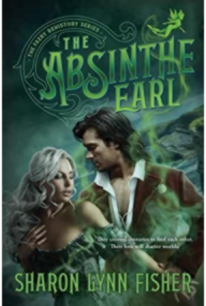 The Faery Rehistory Series — Book 1
The Faery Rehistory Series — Book 1
ISBN-10: 1982684410
ISBN-13: 978-1982684419
ASIN: B07PB5DNC3
October 15, 2019
Historical Romance with strong Fantasy elements
Dublin, Ireland – 1882
English scholar Ada Quicksilver is studying the effects of absinthe on the possibility of fairy sightings. She is visiting Ireland to learn more and to discover evidence, if possible. One evening a few days before Christmas, she enters the Green Fairy absinthe house in Dublin to further her research on her thesis of “Anthropologic Explanations for the Exodus of the Daoine Maithe,” or ‘gentlefolk’ as Irish refer to fairies. Recent articles in several well-respected newspapers claim a connection between imbibing the green-colored alcoholic beverage absinthe and the ability to see fairies. She is looking for people who know of fairy stories, or those who have had firsthand experience with fairies. A slightly scruffy-looking man wearing green-tinted spectacles approaches and offers her a glass of absinthe. He explains it is a bribe in exchange for his claiming the unused chair at her table. His clothes are soaked from his ride from the harbor, and he wishes to warm up and dry out before the fire. He introduces himself as Mr. Donoghue. They start a conversation. He soon explains he thought her older. A not uncommon comment as her premature silver-colored hair makes this a frequent misconception. A waiter approaches and places a glass on the table apologizing to Lord Meath for the delay. It surprises her, but their conversation continues. Soon she is explaining a single, respectable woman’s purpose in visiting such a place.
Edward Donoghue, Earl of Meath, is intrigued with Miss Quicksilver’s observations. He suffers from sleepwalking and has encounters with fay he cannot explain. Absinthe helps stop his night wanderings which allows him to sleep, and the green-tinted spectacles limit some of the odd beings he sees. He thought he was losing his mind, as did others who know him. Now he wants to learn the truth. Even in this place, though, a banshee appears and curls around Miss Quicksilver, warning him of her imminent death. Besides his strong attraction, he wants to protect this young woman. He can use Queen Isolde of Ireland’s demand to do so. Besides being queen, Isolde is his cousin. She has asked him to inspect the site of the ancient fairy mound Bru na Boinne. Then too, Miss Quicksilver’s curiosity and knowledge might help not only him personally but also in fulfilling the Queen’s request.
In THE ABSINTHE EARL, author Sharon Lynn Fisher creates a fantasy world steeped in actual Irish history and mythology. One of Edward’s ancestors is Diarmnid (Deer-mid), a legendary warrior of the Tuatha De Danaan, an ancient supernatural people of Ireland. His love for Cliona made Diarmnid use a seal to force the immortal out of human Ireland; however, the seal is weakening. Diarmnid takes control of Edward’s body at night. Ada has an ancestral link to Cliona. Cliona was a mortal who became the immortal queen of the banshees in death. Cliona speaks within Ada’s mind and sometimes takes over her body. Both Edward and Ada feel their attraction to each other, but is it really an attraction between their human selves or that between Diarmnid and Cliona? To help save Ireland they must travel a dark and dangerous trail through the alternate world of Faery. Can they reclaim their minds and bodies after these ancient ancestors have invaded them? The story is full of romance and danger with faery-enhanced situations. The author uses lyrical description to great effect, which enhances the tale’s supernatural landscape and seems to imbue the story in Irish feeling. The story creates a fascinating mixture of the historical and fantasy genres.


